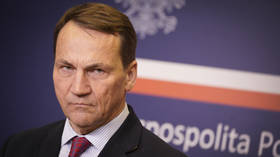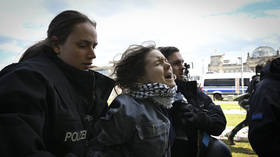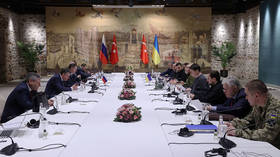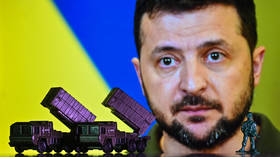US could put Assange to death if it gets him – former senior NSA official
If America gets its hands on the WikiLeaks founder, they may go as far as execute him, a known National Security Agency whistleblower Thomas Andrews Drake told RT, adding that in the US, security has become a state religion.
An expert on electronic eavesdropping, Drake sacrificed his career to blow the whistle on perceived wrongdoings within the NSA. He was charged under the Espionage Act, though the charges were dropped only last year.He told RT that in America’s ‘soft tyranny’, everyone is subject or suspect in terms of surveillance.
RT: What was the potential harm of the program that you challenged while working with the NSA?Thomas Drake: There was a very large flagship program called Trailblazer that was designed to catapult the NSA into the twenty first century to deal with the vast amounts of data generated by the digital age. Given the massive fraud and abuse that the NSA had created with the Trailblazer program, as well as the super secret surveillance program, the NSA completely violated the Constitution and the Fourth Amendment. In particular, the stature called the Foreign Intelligence Surveillance Act, which was the first commandment at the NSA: you did violate Americans’ privacy without a warning, and if you did – there is a criminal penalty for doing so. And I found this out to my horror and shock, that shortly after 9/11, the NSA entered a secret agreement with the White House in which the NSA would become the executive agent for this secret surveillance program.On the front end, it was designed to deal with a terrorist threat – and that was quite understandable. But what it did – it actually turned the US into a collection platform.Vast rims of data were increasingly being collected through other entities and saved for analysis.RT: There is a lot of debate about the proposed legislation CISPA enabling providers (Google, Facebook etc.) to share users’ personal data with the government. Are they already doing that? Do they need this legislation to protect themselves from being liable for what they are already doing?TD: I believe that is a part of it. The other part is the government just wants even more access to even more data. Under the Patriot Act there is a secret executive interpretation which essentially grants the government pretty much unfettered access to subscriber information held by those companies. CISPA would take that to a next level. Under the label or the rubric of cyber threats, and to provide cyber security, the government wants even more invasive access to networks not normally available to that public.RT: So what is the goal; is it total surveillance?TD: If you take what has been happening in the post-9/11 security world, what you’re see is the establishment of a surveillance society – the establishment of a surveillance network. People don’t realize the extent to which we’re surveilled in many, many ways. The extent to which vast amounts of our transactional data in all forms – electronic forms, your emails, your tweets, bank records and everything else – are all subject or suspect in terms of surveillance. It raises the specter of the rise of so-called “soft tyranny.” It raises the specter of you being automatically suspicious until you prove that you’re not; the specter of a universal and persistent wiretap on every single person. If not – they can create one. Because what happens if they don’t like you? What if you speak ill will against the government? What if you say something they consider disloyal? That is not the country I took an oath to defend four times in my government career.There is also a fear element. Fear in itself is control. What would people do when they are fearful is they would begin to censor themselves. It sends an extraordinary chilling message that if you speak out – they are going to hammer you hard. Our security has become our state religion, you don’t question it. And if you question it – your loyalty is questioned.RT: A question about Wikileaks’ founder Julian Assange. How angry you think Washington is at Julian Assange?TD: They are extremely angry. According to press reports, there has been a secret Grand Jury and maybe a secret indictment. They want to get him and put him away. There are those at high levels in this country – they have called for a death warrant. Believe me, if the US get its hands on him – they’re going to do everything they can to put him away for as long as they can – or worse.Speaking truth to power is very dangerous. The power elites, those in charge don’t like dirty linen being aired. They don’t like skeletons in the closet being seen. Not only do they object to it, they decide to turn it into criminal activity. Remember, my whistle blowing was criminalized by my own government. RT: Journalists exposing civilian deaths in drone strikes are exposed as helping terrorist. The terrorist-helper label has become a convenient tool to brush off investigative journalism, hasn’t it?TD: What it is, you go after the messenger to deal with the message… because addressing the message has become very uncomfortable.If we start moving away from the law, which has already happened very significantly, and leave it to policy as a substitute – we’re going down a very slippery slope in the US.RT: US officials condemn cyber attacks but it turns out the US government itself is involved in cyber attacks (like Stuxnet and Flame viruses). How do you see that? TD: There are authorized leaks, which is an oxymoron coming from senior administration officials.RT:They want people to know that?TD: Right. I believe that is the case. They actually wanted people to know what the US is capable of doing. It is another form of warfare, it is a cyber weapon. But it is a Pandora’s box because we’re on uncharted territories of a virtual war.The Pentagon itself has it on record that if a nation conducts actions against the US using things like Stuxnet – that’s an act of war. But we consider it (our actions) information or cyber operations. It goes under a whole host of different labels to make it something different from what it really is. So where are the lines drawn?













